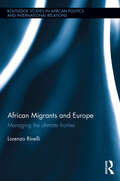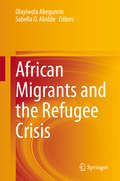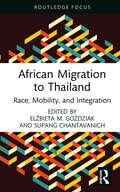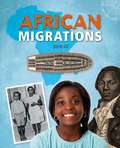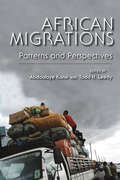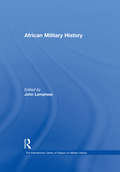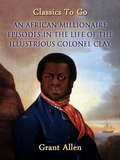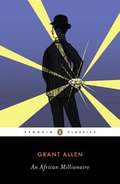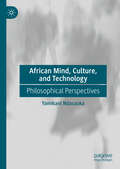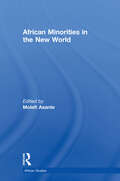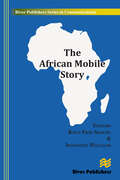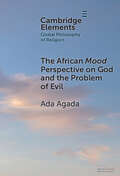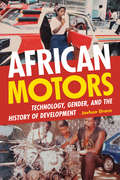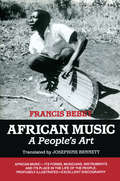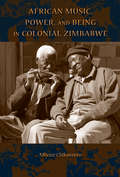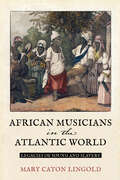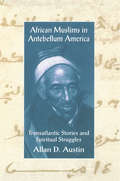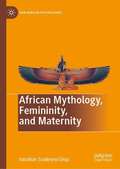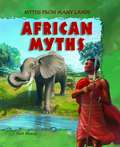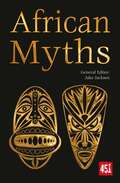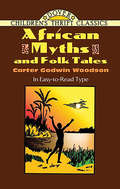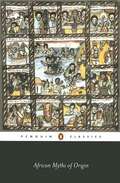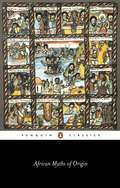- Table View
- List View
African Migrants and Europe: Managing the ultimate frontier (Routledge Studies in African Politics and International Relations)
by Lorenzo RinelliThe process of migration control mirrors the trajectories of the people who traverse national boundaries, making today’s borders flexible and fluid. This book explores the transformation of migration control in the post 9/11 era. It looks at how border controls have become more diffuse in the face of increased human flows from Africa and presents a critical analysis of the dispositif of European migration control, including detention without trial, derogation of human rights law, torture, "extraordinary rendition", the curtailment of civil liberties and the securitization of migration. By examining the role of Gaddafi’s Libya in the last ten years as a gendarme of Europe, it argues for a re-visioning of borders and frontiers in ways that can account for their dialectical nature, and for the dialectical nature of political life. This text will be of key interest to scholars and students of European studies, African studies, security studies, international relations, global studies, comparative politics, cultural geography, migration studies and border theory.
African Migrants and the Refugee Crisis
by Olayiwola Abegunrin Sabella O. AbiddeThis book discusses African migration and the refugee crisis. Economic, political and social tension in the Middle East and in many parts of the Global South has induced historic mass migration across national and international borders. The situation is especially dire in Africa, where a sizable number of Africans have chosen or have been forced to leave their countries of origin for Europe and North America. Written by an international team of scholars, this edited book traces the refugee crisis around the world, telling the necessary story of forced migration, intentional exclusion, and human insecurity from an Afrocentric lens. The volume is divided into three sections. Section I places African migration within the broader contexts of international history, law, economics, and policy. Section II discusses cases of African migration to Europe, Latin America, and the Mediterranean. Section III considers negative consequences of mass African migration, including the restriction and criminalization of migration, post-traumatic stress disorder, and gender-based violence. A compelling account of risk, resilience, and global power dynamics, this volume will be useful to students and researchers interested in African studies, migration, peace and conflict studies, and policy as well as professionals, practitioners, NGOs, IGOs, governmental and humanitarian organizations.
African Migration to Thailand: Race, Mobility, and Integration (Routledge Series on Asian Migration)
by Elżbieta M. Goździak and Supang ChantavanichThis book, based on exploratory ethnographic research, analyzes the experiences of African migrants in Thailand. Thailand has always been a regional migration hub with Africans being the most recent. Sitting at the intersection of race and migration studies, this book focuses on the challenges Black and labor migrants face trying to integrate into a society that has had very limited contact with and knowledge about Black Africans. Bringing together research from African, Thai, and European scholars, this volume focuses on forced migrants, such as Somali asylum seekers, and labor migrants, largely African men seeking better livelihoods in niche economies such as gem trading, garment wholesale, and football playing and coaching. The book also includes theoretical contributions to the understanding of precarity and human security, the concept of in/visibility to analyze the challenges African migrants face in Thailand as well as the concept of othering to understand discrimination against Africans. The book also analyzes the Thai migration policy context and the challenges facing Thai policy-makers, law enforcement representatives, and the migrants themselves. While not comparative in nature, this volume directly connects with studies of Africans in other parts of Asia, especially China. Addressing an important gap in migration research, this book will be of interest to researchers across the fields of migration and mobility studies, African Studies, and Asian Studies.
African Migrations
by Hakim AdiDiscover the fascinating history of African migration, from thousands of years ago to the 21st Century.Newly updated, African Migrations explores the history of migration from Africa, from the forced migrations of slavery and the experiences of life in the Americas to the political and economic migrations of more recent times. Experiences are brought to life with case studies of children from the 20th and 21st centuries.Written by British historian and academic Hakim Adi, Profressor of the History of Africa and the African diaspora at the University of Chichester, this book is essential reading for children aged 11+ and anyone interested in learning about African migrations.
African Migrations: Patterns And Perspectives
by Todd H. Leedy Abdoulaye KaneSpurred by major changes in the world economy and in local ecology, the contemporary migration of Africans, both within the continent and to various destinations in Europe and North America, has seriously affected thousands of lives and livelihoods. The contributors to this volume, reflecting a variety of disciplinary perspectives, examine the causes and consequences of this new migration. The essays cover topics such as rural-urban migration into African cities, transnational migration, and the experience of immigrants abroad, as well as the issues surrounding migrant identity and how Africans re-create community and strive to maintain ethnic, gender, national, and religious ties to their former homes.
African Military History (The International Library of Essays on Military History)
by John LamphearThis collection of essays on pre-colonial sub-Saharan African military history is drawn from a number of academic journals and includes some which are considered milestones in African historiographical discourse, as well as others which, while lesser known, provide remarkable insight into the unique nature of African military history. Selections were made so as to produce an introduction to the understudied field of pre-colonial African military history that will be useful to specialists and non-specialists alike. The volume also contains an introduction which presents one of the first significant reviews of pre-colonial African military historiography ever attempted.
An African Millionaire: Episodes In The Life Of The Illustrious Colonel Clay (Classics To Go)
by Grant AllanGrant Allen's "An African Millionaire", first published in 1897, is a classic in rogue fiction: a South African millionaire is hounded by a mischievous and larcenous conman, Colonel Clay. The tables may turn, but who is the greater rogue: the conman or the victim?
An African Millionaire
by Grant AllenAn excellent addition to Penguin's crime classics: the tantalizing tale of Colonel Clay, literature's first gentleman rogue. Wealthy, confident and handsome, Sir Charles Van Drift spends his time jetting to exotic locales with his wife and in-laws. But on one fateful trip to the Riviera, Van Drift meets his match in Colonel Clay. Posing alternately as a seer, a curate, and a German professor, the master of disguise swindles Van Drift through three continents and poses a serious risk to his South African diamond fortune. Colonel Clay, the notorious con artist and thief, has triumphed. But who is this master of disguise, really? First serialized in The Strand in 1896, the adventures that comprise An African Millionaire are widely regarded as the first to feature a criminal protagonist and will be greeted enthusiastically by fans and scholars of classic crime fiction. .
African Mind, Culture, and Technology: Philosophical Perspectives
by Yamikani NdasaukaThis book provides a philosophical investigation of technology in Africa, articulating conceptual foundations and analyses rooted in African worldviews and communitarian values. It aims to spur discourse and understanding of how technology can be justly shaped for human advancement in Africa. Yamikani Ndasauka highlights the need to understand African conceptions of existence, ethics, and values as foundations for envisioning more humanistic technological applications. A historical contextualisation traces the layered origins of African technology philosophy in indigenous innovation, resistant adaptation of external systems, and creative fusion of endogenous and exogenous knowledge. The book develops African frameworks to assess and design technology in accord with human dignity and collective advancement.
African Minorities in the New World (African Studies)
by Toyin Falola Niyi AfolabiThis book uncovers the reality that new African immigrants now represent a significant force in the configuration of American polity and identity especially in the last forty years. Despite their minority status, African immigrants are making their marks in various areas of human endeavor and accomplishments—from academic, to business, to even scientific inventions. The demographic shift is both welcome news as well as a matter for concern given the consequences of displacement and the paradoxes of exile in the new location. By its very connection to the ‘Old African Diaspora,’ the notion of a ‘New African Diaspora’ marks a clear indication of a historical progression reconnecting continental Africa with the New World without the stigma of slavery. Yet, the notion of trans-Atlantic slavery is never erased when the African diaspora is mentioned whether in the old or new world. Within this paradoxical dispensation, the new African diaspora must be conceived as the aftermath of a global migration crisis.
The African Mobile Story (River Publishers Series In Communications Ser.)
by Knud Erik Skouby Idongesit WilliamsAfrica and especially Sub-Saharan Africa has during the past decade witnessed one of the fastest growing markets in mobile communication. This growth is recognized to have played a pivotal role in Africa’s socio-economic development. It has had a huge impact on residential living patterns; on business networks and models; and on government services and income sources. The mobile industry has contributed more to economic growth than in any other comparable region globally introducing innovative, broadly used applications. Technical topics discussed in the book include:• Mobile Development in Sub-Saharan Africa;• Telecom Liberalization in Africa;• Role of Mobile in Socio-economic Development;• Mobile Applications in specific sectors;• Security in African Mobile;• Role of Prepaid in Africa
The African Mood Perspective on God and the Problem of Evil (Elements in Global Philosophy of Religion)
by Ada AgadaThis Element concisely and critically explores the African limited God perspective that denies that the categories of omnipotence, omniscience, and omnibenevolence are applicable to the God of African Traditional Religion (ATR). The Element teases out the intricate conceptual nuances in the limitation thesis and interrogates the divergent stances of proponents of the limited God view, with special focus on the mood perspective of the philosophy of consolationism. Proponents of the limitation thesis may be limited God theists who accept that the limited God is a creator-deity or, at least, a world-designer, or limited God non-theists who deny the limited God personality and agency. The Element expands the frontiers of research in African philosophy of religion by showing that the limitation thesis raises the question of a limited God's moral responsibility for some of the evil in the world in his capacity as a world-creator or world-designer.
African Motors: Technology, Gender, and the History of Development
by Joshua GraceIn African Motors, Joshua Grace examines how Tanzanian drivers, mechanics, and passengers reconstituted the automobile into a uniquely African form between the late 1800s and the early 2000s. Drawing on hundreds of oral histories, extensive archival research, and his ethnographic fieldwork as an apprentice in Dar es Salaam's network of garages, Grace counters the pervasive narratives that Africa is incompatible with technology and that the African use of cars is merely an appropriation of technology created elsewhere. Although automobiles were invented in Europe and introduced as part of colonial rule, Grace shows how Tanzanians transformed them, increasingly associating their own car use with maendeleo, the Kiswahili word for progress or development. Focusing on the formation of masculinities based in automotive cultures, Grace also outlines the process through which African men remade themselves and their communities by adapting technological objects and systems for local purposes. Ultimately, African Motors is an African-centered story of development featuring everyday examples of Africans forging both individual and collective cultures of social and technological wellbeing through movement, making, and repair.
African Music: A People's Art
by Francis BebeyEngaging and enlightening, this guide explores African music's forms, musicians, instruments, and place in the life of the people. A discography classified by country, theme, group, and instrument is also included.
African Music, Power, and Being in Colonial Zimbabwe
by Mhoze ChikoweroIn this new history of music in Zimbabwe, Mhoze Chikowero deftly uses African sources to interrogate the copious colonial archive, reading it as a confessional voice along and against the grain to write a complex history of music, colonialism, and African self-liberation. Chikowero's book begins in the 1890s with missionary crusades against African performative cultures and African students being inducted into mission bands, which contextualize the music of segregated urban and mining company dance halls in the 1930s, and he builds genealogies of the Chimurenga music later popularized by guerrilla artists like Dorothy Masuku, Zexie Manatsa, Thomas Mapfumo, and others in the 1970s. Chikowero shows how Africans deployed their music and indigenous knowledge systems to fight for their freedom from British colonial domination and to assert their cultural sovereignty.
African Musicians in the Atlantic World: Legacies of Sound and Slavery (New World Studies)
by Mary Caton LingoldMusic, that fundamental form of human expression, is one of the most powerful cultural continuities fostered by enslaved Africans and their descendants throughout the Americas. The roots of so much of the music beloved around the world today are drawn directly from the men and women carried across the Atlantic in chains, from the west coast of Africa to the shores of the so-called New World. This important new book bridges African diaspora studies, music studies, and transatlantic and colonial American literature to trace the lineage of African and African diasporic musical life in the early modern period.Mary Caton Lingold meticulously analyzes surviving sources, especially European travelogues, to recover the lives of African performers, the sounds they created, and the meaning their musical creations held in Africa and later for enslaved communities in the Caribbean and throughout the plantation Americas. The book provides a rich history of early African sound and a revelatory analysis of the many ways that music shaped enslavement and colonization in the Americas.
African Muslims in Antebellum America: Transatlantic Stories and Spiritual Struggles
by Allan D. AustinA condensation and updating of his African Muslims in Antebellum America: A Sourcebook (1984), noted scholar of antebellum black writing and history Dr. Allan D. Austin explores, via portraits, documents, maps, and texts, the lives of 50 sub-Saharan non-peasant Muslim Africans caught in the slave trade between 1730 and 1860. Also includes five maps.
African Mythology (Mythology Around The World Ser.)
by Sandra GiddensAfrican mythology is as vast as the African continent itself. The myths of Africa vary from country to country and have been passed down orally through a strong communal tradition. Readers learn exactly what mythology is, why it is so important to cultures, and how the mythology ties in to Africa s history.
African Mythology, Femininity, and Maternity (Pan-African Psychologies)
by Ismahan Soukeyna DiopThis book explores feminine archetypes and mythological figures in African and European traditions with an underlying goal of describing the foundations of social status for women. The author provides a rich corpus of mythology and tales to illustrate aspects of female and mother-daughter relationships. Diop analyzes the symbolic aspects of maternity and femininity, describing the social meaning of the matrix, breasts, and breastfeeding. A retrospective of female characters in African literature brings an interesting approach to explore the figures of femininity and maternity in society. After an extensive analysis of African mythology and tales, the author proposes a way to integrate them in the clinical psychotherapy as a projective material. The analysis of clinical cases offers an example of how this material can be used in therapy with women from African descent.
African Myths (Myths From Many Lands)
by Neil Morris Graham KennedyReaders learn the mythological explanations of how the universe was created, the sun was stolen, and how a spider gained the world's collection of stories.
African Myths (The World's Greatest Myths and Legends)
by Flame Tree StudioSub-Saharan Africa is a land of colourful contrasts and diverse cultures. Despite the destructive influences of colonialism and the slave trade and the lack of early written records, Africa has persevered with its powerful tradition of storytelling, with tales of its history passed down in songs and stories through the generations. Because of the huge diversity of lifestyles and traditions, no real unified mythology exists in Africa, but broadly speaking, a number of beliefs, ideas and themes are shared by African peoples. So this collection offers a selection of descriptions and tales, often those recorded faithfully by some of the first to put them to paper – tales of the gods, creation stories, trickster adventures, animal fables and stories which amuse and teach – from Olukun&’s Revenge, from the Yoruba people of west Africa, to The Story of the Glutton, from the Bantu-speaking peoples of east Africa, all brought together with the aim of providing an insight into the boundless and vibrant world of African myth. FLAME TREE 451: From mystery to crime, supernatural to horror and myth, fantasy and science fiction, Flame Tree 451 offers a healthy diet of werewolves and mechanical men, blood-lusty vampires, dastardly villains, mad scientists, secret worlds, lost civilizations and escapist fantasies. Discover a storehouse of tales gathered specifically for the reader of the fantastic.
African Myths and Folk Tales (Dover Children's Thrift Classics)
by Carter Godwin WoodsonHow was the earth formed, and where did animals come from? Why does the hippopotamus live in water, and why do cats chase rats? Imaginative answers to these and other age-old questions can be found among the rich oral traditions of Africa. Generations of listeners have delighted in these fanciful explanations of the natural, moral, and spiritual worlds, which unfold amid a realm of talking animals, magic drums, tricksters, and fairies.Known as the "Father of Black History," Carter Godwin Woodson was among the first scholars to promote the history and achievements of African-Americans. His compilation of fables about a jealous blind man, a disobedient daughter, a rivalry among brothers, and other timeless predicaments is punctuated with thought-provoking proverbs and gentle humor. Told in simple language, these tales will enchant readers and listeners of all ages. Over sixty evocative illustrations appear throughout the book.
African Myths and Legends (World Books Myths and Legends)
by Philip ArdaghA collection of traditional tales from Africa, reflecting the cultures and religions from which the stories come.
African Myths Of Origin
by Stephen BelcherGathering a wide range of traditional African myths, this compelling new collection offers tales of heroes battling mighty serpents and monstrous birds, brutal family conflict and vengeance, and desperate migrations across vast and alien lands. From impassioned descriptions of animal-creators to dramatic stories of communities forced to flee monstrous crocodiles, all the narratives found here concern origins - whether of the universe, peoples or families. Together, they create a kaleidoscopic picture of the rich and varied oral traditions that have shaped the culture and society of successive generations of Africans for thousands of years, throughout the long struggle to survive and explore this massive and environmentally diverse continent.
African Myths of Origin
by Stephen BelcherGathering a wide range of traditional African myths, this compelling new collection offers tales of heroes battling mighty serpents and monstrous birds, brutal family conflict and vengeance, and desperate migrations across vast and alien lands. From impassioned descriptions of animal-creators to dramatic stories of communities forced to flee monstrous crocodiles, all the narratives found here concern origins - whether of the universe, peoples or families. Together, they create a kaleidoscopic picture of the rich and varied oral traditions that have shaped the culture and society of successive generations of Africans for thousands of years, throughout the long struggle to survive and explore this massive and environmentally diverse continent.
